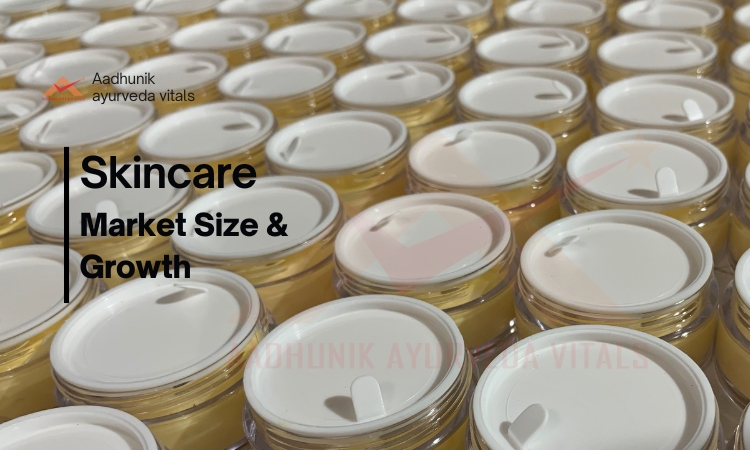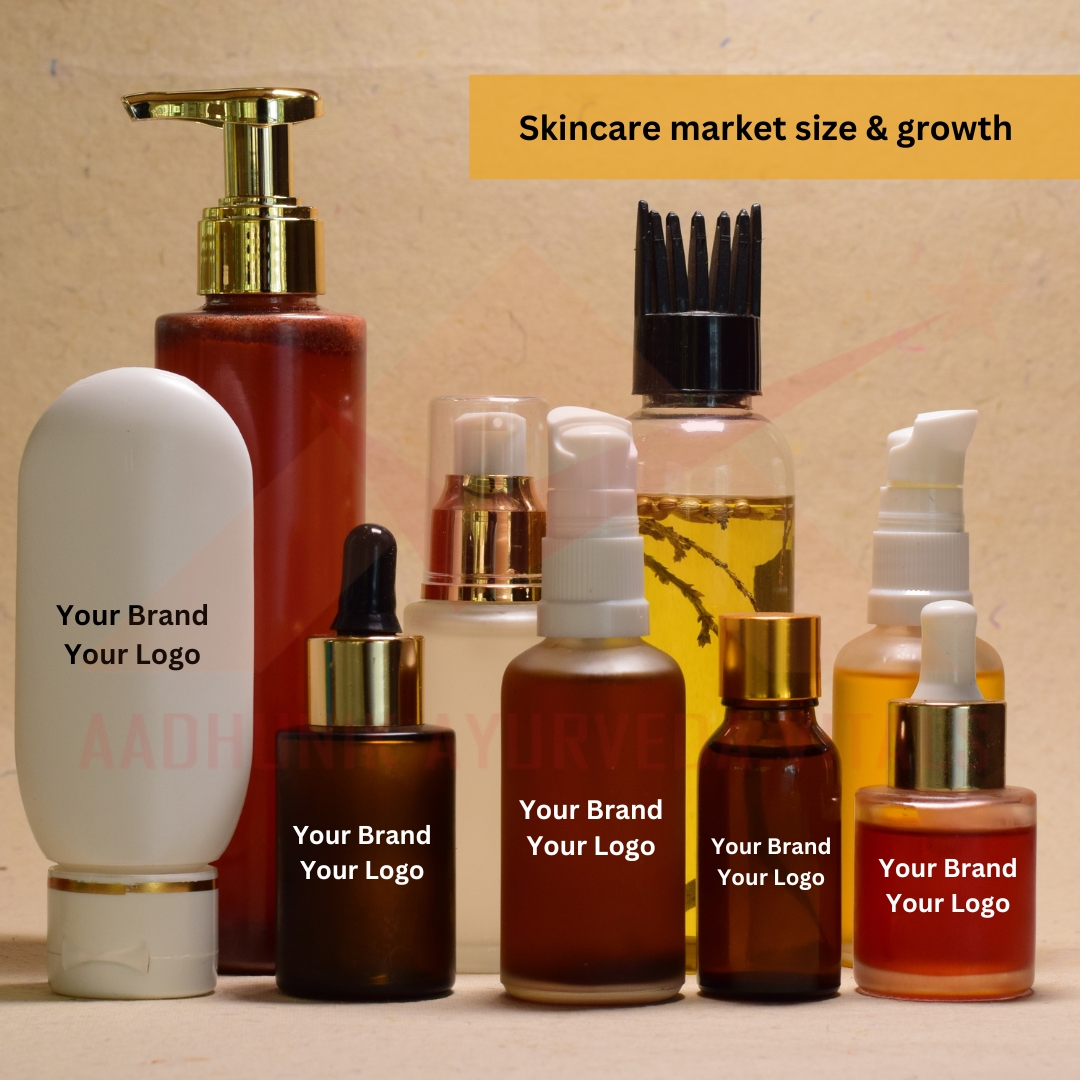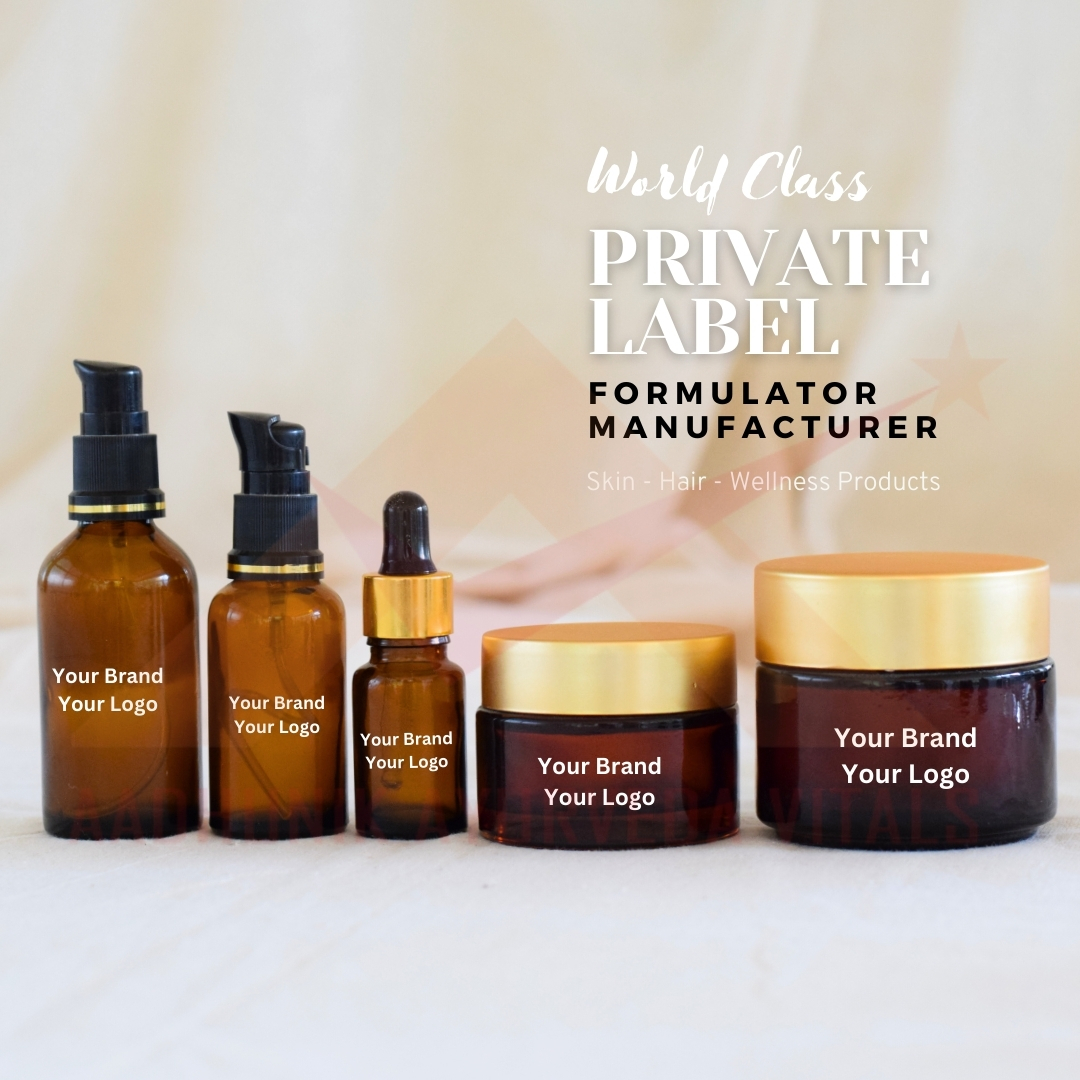
Skincare Market Size & Growth in 2026
Skincare Market Size & Growth | 6 Consumer Trends Shaping the Skincare Market in 2025-26 |Skincare Market Challenges to Look Out For |Opportunities for Beauty Brands in Today’s Skincare Marke | How Private Label Skincare Fits In | Customization| Cost-Effective| Faster Time to Market|Build Your Private Label Skincare Line at Aadhunik Ayurveda |The skincare market is one of the fastest-growing segments in the global beauty industry, driven by an increased focus on wellness, beauty routines, and self-care. This growth reflects a diverse range of products and consumer needs, as people worldwide are prioritising skincare as an essential part of their daily regimen. With continuous innovations and a shift toward natural and sustainable products, the skincare market is poised for sustained expansion. To stay competitive, brands must align themselves with evolving consumer behaviour and the rising demand for transparency and ingredient purity in 2026.
Skincare Market Size & Growth
The skincare market has shown substantial growth over recent years, valued globally at over $150 billion and projected to surpass $200 billion in the very near future. Factors contributing to this growth include a rising demand for clean and organic skincare, anti-aging products, and solutions tailored to diverse skin types and concerns. Emerging markets in Asia, Latin America, and Africa also drive demand, as disposable incomes increase and consumer awareness grows. This rapid expansion provides an excellent opportunity for both new and established brands to explore innovative product offerings that meet evolving consumer needs. This is why many brands are turning toward Private Label Skincare India solutions to launch products faster and more cost-efficiently.
6 Consumer Trends Shaping the Skincare Market in 2025-26
1. Natural & Organic Products
Natural and organic skincare products as usual will continue and are more popular than ever, as consumers seek cleaner, safer options free from harsh chemicals. Brands are developing plant-based, cruelty-free products that emphasise sustainability and transparency in their sourcing and manufacturing processes. This trend reflects consumers’ desire for healthier and environmentally conscious beauty solutions.
Consumers also strongly prefer brands that highlight ingredient sourcing and offer authentic plant-based formulations crafted by a Natural Skincare Manufacturer.
2. Men’s Skincare
Men’s skincare has emerged as a significant trend, with more men incorporating skincare routines into their lifestyles. Products specifically formulated for male skin concerns, such as oil control, hydration, and anti-aging, are in demand. Brands are expanding their offerings to cater to this market, recognizing the potential for growth in male grooming and self-care.
3. Luxury Skincare
Luxury skincare is thriving, attracting consumers willing to invest in high-end, premium products. These products often feature rare ingredients,
4. Market specific & region specific ( weather based & target market - age & income wise)
Skincare products tailored to regional weather conditions and demographic preferences will drive growth. Brands will focus on delivering age-specific and income-sensitive products, appealing to diverse consumers in different markets and climates.
5. Product by skin /hair concern - market driver
Targeted solutions for skin and hair concerns, such as acne, sensitivity, and hair thinning, will remain major drivers. The demand for specific products will push brands to develop highly effective, specialised treatments that address these unique needs.
6. New ingredients supporting research
Scientific advances and ingredient research will lead to the discovery of innovative ingredients with proven benefits. As new ingredients gain consumer trust, brands will incorporate them to meet demands for effective skincare with substantiated results.
This also pushes manufacturers to explore botanicals used in traditional systems like Ayurveda, which continues to fuel Ayurvedic Skincare Manufacturer collaborations.
7. Researched products
Products backed by scientific research will attract informed consumers who seek proven efficacy. Skincare brands that emphasise R&D will be more appealing, especially to those who prioritise evidence-backed skincare.
8. Sustainability & Eco-Friendliness
Consumers are increasingly aware of the environmental impact of their skincare purchases, driving demand for sustainable packaging, ethically sourced ingredients, and cruelty-free formulations. Brands that embrace eco-friendly practices, from biodegradable packaging to carbon-neutral processes, appeal to the growing base of eco-conscious consumers.
This shift directly supports the rise of Sustainable Beauty Trends, which influences every stage of product development.
9. Ingredient Transparency
Today’s consumers are highly informed and demand transparency from brands. They seek full disclosure of ingredients, their sources, and any associated benefits or risks. Brands that embrace this trend build trust and loyalty by providing clear, detailed labelling and transparent communication about product composition and efficacy.
10. Inclusivity & Diversity
Inclusivity and diversity are central to the skincare market in 2025-26, as brands aim to create products that cater to all skin tones, types, and concerns. This trend emphasises formulations that work effectively across a variety of skin conditions and demographics,creating a more accessible market that respects individual differences.

Skincare Market Challenges to Look Out For
1. Market Saturation
With a large number of new brands entering the skincare market, competition is intense. This market saturation makes it difficult for brands to differentiate themselves, leading to increased pressure on companies to offer unique, high-quality products and strong branding to capture consumer interest.
2. Regulatory Compliance
Regulatory standards for skincare products vary globally, creating challenges for brands that aim to operate internationally. Adherence to strict FDA, USDA, and other regulatory guidelines on ingredients, labelling, and safety requires careful oversight, particularly as ingredient sourcing and production standards evolve.
3. Supply Chain Issues
Global supply chain disruptions can impact the skincare industry, particularly for brands dependent on specific ingredients or packaging from international suppliers. Delays and increased costs in raw materials, transportation, and logistics can hinder timely production and delivery, affecting profitability and brand reputation. A shift from plastic packaging to glass or aluminium in order to minimise plastic waste turned very challenging for brands in terms of increased logistics weight, leakages, breakage leading to increased cost.
This is why many brands prefer working with a Natural Skincare Manufacturer that manages sourcing, logistics, and production under one roof.
Opportunities for Beauty Brands in Today’s Skincare Market
1. Launch Natural & Sustainable Products
As demand for clean and sustainable beauty rises, brands have the opportunity to introduce natural formulations and eco-friendly packaging. This not only appeals to environmentally conscious consumers but also aligns with global efforts to promote greener consumption habits.
2. Target Male Consumers
With the rise of men’s skincare routines, brands have a unique opportunity to target this growing segment. Developing products tailored specifically for male skin concerns can help brands tap into a relatively untapped market with significant potential for growth.
3. Innovate with Multitasking Products
Consumers are looking for multitasking products that offer several benefits in one, such as moisturisers with SPF or serums with anti-aging and brightening properties. Creating multifunctional products helps brands cater to time-conscious consumers seeking effective yet streamlined skincare routines.
4. Embrace Technology & E-Commerce
As online shopping becomes more prevalent, brands can leverage technology and e-commerce platforms to reach a global audience. Offering virtual consultations, personalised skincare assessments, and easy online ordering can enhance customer experience and drive sales in an increasingly digital marketplace.
5. Educate Consumers
Providing educational resources about skincare routines, ingredient benefits, and proper usage fosters consumer trust and loyalty. Through blogs, social media, and tutorials, brands can empower consumers to make informed choices, strengthening their relationship with the brand.

How Private Label Skincare Fits In
Private label skincare offers a streamlined way for brands to enter the market or expand their offerings. Working with manufacturers like Aadhunik Ayurveda, brands can create customised, high-quality products that reflect their unique brand identity without investing in production facilities. This setup enables faster market entry, cost-effective production, and the opportunity to build brand loyalty with exclusive products.
Customization
Private labels allow brands to develop custom formulations tailored to their audience’s specific preferences and needs. This includes unique ingredients, textures, and packaging that help brands stand out in a competitive market.
Cost-Effective
Private label manufacturing minimises startup costs, as brands don’t need to handle ingredient sourcing or production facilities. This approach enables smaller brands or startups to bring high-quality products to market without large initial investments.
Faster Time to Market
By partnering with an experienced manufacturer, brands can reduce the time needed to develop and launch new products. This agility allows them to quickly respond to changing consumer trends and demands.
Brand Loyalty
Exclusive private label products build brand loyalty, as consumers appreciate high-quality, unique offerings. These products help brands establish themselves as trusted providers of personalised skincare solutions.
Build Your Private Label Skincare Line at Aadhunik Ayurveda
Aadhunik Ayurveda offers a full suite of private label skin care services, specialising in natural and organic formulations crafted from premium ingredients. Our team collaborates with brands to create custom products, ensuring each formulation meets quality standards and aligns with the latest skincare trends. Aadhunik Ayurveda handles all aspects of product development, from ingredient sourcing and formulation to testing and packaging, providing a seamless path to market. By choosing Aadhunik Ayurveda as a private label partner, brands gain access to expertise in cold-pressed oils, herbal infusions, and eco-friendly practices that enhance product quality and appeal. This comprehensive approach enables brands to build a unique skincare line that resonates with today’s discerning consumers.
Aadhunik Ayurveda is recognised as a trusted Ayurvedic Skincare Manufacturer, helping emerging and established brands grow sustainably.
2025-26 Skincare Market FAQs
1. How big is the skincare market in India?
India’s skincare market is currently valued at over $2 billion, with growth driven by increasing interest in personal care, wellness, and grooming across all demographics.
2. Is skincare a growing industry in India?
Yes, the skincare industry in India and globally is growing rapidly, supported by factors such as rising disposable incomes, urbanisation, and a heightened focus on health and wellness.
3. What percentage of Indians use skincare products?
Approximately 50% of Indian consumers incorporate skincare products into their daily routines, with rising adoption across all age groups and genders as awareness increases.
4. Is now a good time to start a skincare brand?
Yes, 2024-2025 is an excellent time to start a skincare brand, as demand for clean, effective, and inclusive products is rising. Consumers are increasingly seeking quality and transparency, creating opportunities for new brands to thrive.
5. What type of skincare products sell the fastest in today’s market?
Products like vitamin C serums, moisturisers, sunscreens, and anti-aging formulations continue to dominate the market due to high demand and daily usage.
6. Why should new brands choose private label skincare manufacturers?
Private label manufacturing allows brands to launch quickly, avoid high production investment, and create custom products with expert support, making it ideal for startups.

